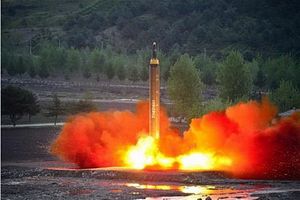On August 29, the United Nations Security Council (UNSC) hosted an urgent meeting on North Korea’s latest missile launch as well as the series of launches that took place on 25 August. In a statement following the meeting, the UNSC unanimously condemned North Korea’s “outrageous actions.” Meanwhile, although in line with the UNSC’s position, China strongly opposes any unilateral sanctions against North Korea.
In the statement, the UNSC expressed the 15-member body’s grave concern that “North Korea, by conducting such a launch over Japan, deliberately undermining regional peace and stability and have caused grave security concerns around the world.” Thus, the UNSC strongly demanded North Korea to“immediately cease all such actions” and “fully comply with its international obligations and to work to re-open channels of communication.”
Meanwhile, U.S. President Donald Trump’s rhetoric is getting increasingly more belligerent. After warning that “all options are on the table” on August 29, he threatened to use military action on August 30 in a tweet: “The U.S. has been talking to North Korea, and paying them extortion money, for 25 years. Talking is not the answer!”
In response, China stressed that it opposes the imposition of unilateral sanction on North Korea. Chinese Foreign Ministry Spokeswoman Hua Chunying said on August 30:
We believe that all sanction measures against the DPRK shall fall within the framework of the UN Security Council and follow the resolutions of the Security Council resolutions. Whether there will be more measures shall be decided by the Security Council upon consensus. Meanwhile, we oppose any country using unilateral sanctions, or evoking its domestic laws to impose “long-arm jurisdiction”… We hope that all relevant parties could earnestly, comprehensively and thoroughly implement the existing Security Council resolutions.
In addition, China repeatedly doubted sanctions against North Korea could work.
On August 29, Hua claimed that “we don’t think threat, pressure or sanction can offer a final solution to the issue.” On August 30, she emphasized again that the Korean Peninsula issue has entered “a vicious spiral of nuclear and missile development vis-a-vis sanctions and pressure” and called for “dialogue and peace talks.”
It seems that U.S. Secretary of Defense James Mattis partly agrees with China’s position on dialogue. Contradicting Trump’s “no talking” rhetoric, Mattis told reporters: “We’re never out of diplomatic solutions.”

































